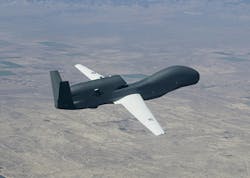Air Force asks industry for new kinds of airborne sensors to find hidden targets
WRIGHT-PATTERSON AFB, Ohio - U.S. Air Force intelligence, surveillance, and reconnaissance (ISR) experts are asking industry for new ways to design electro-optical and radar airborne sensors to detect and pinpoint mobile and hidden targets.
Special Forces and ISR officials of the Air Force Life Cycle Manage- ment Center (AFLCMC) at Wright- Patterson Air Force Base, Ohio, have issued a sources-sought notice (FA8620-16-R-4006) for the Airborne Sensors for Intelligence, Surveillance, and Reconnaissance project.
The project focuses on airborne sensor applications like signals intelligence (SIGINT) and geospatial intelligence (GEOINT) using electro-optical (EO), infrared (IR), multispectral imaging, and hyperspectral imaging sensor technologies, as well as ground-surveillance radar, full-motion video, light detection and ranging (LIDAR), and on-board data fusion.
Air Force officials may use the information from this industry survey to choose a preferred materiel solution for advanced airborne sensors. Experts say the project could help redefine medium- and high-altitude ISR sensors and shape Air Force efforts in the decade from 2020 to 2030.
Of particular interest are on-board sensor processing for several different kinds of aircraft; multi-intelligence sensor operations; and sensor technologies to increase range and resolution as well as aid in rapid targeting.
For the purpose of size, weight, and power consumption (SWaP), proposals should assume the target aircraft for such technologies are the MQ-9 Reaper medium-range unmanned aerial vehicle (UAV), a business jet, and RQ-4 Global-Hawk long-range UAV.
Suggested technologies should be ready for prototype demonstration in a realistic environment by 2020, for initial operational capability by 2026, and for full operational capability by 2030.
Air Force officials are interested in non-proprietary open-systems architectures with on-board data processing for several different airborne sensors.
Companies interested should e-mail white papers to the Air Force's Ed Huling no later than 8 March 2016 at [email protected].
E-mail questions or concerns to Huling, or to the Air Force's Andrew Soine at [email protected].

